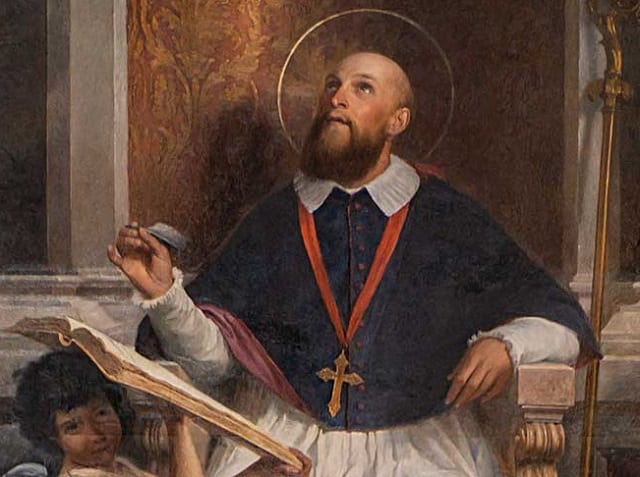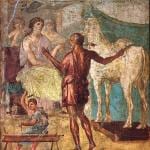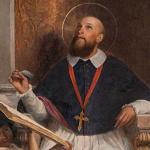
This is one of a series of extensive excerpts (with my occasional commentary) from The Catholic Controversy (1596): a classic of Catholic apologetics (originally a collection of pamphlets), written by St. Francis de Sales (1567-1622): a Doctor of the Church [see all the installments by searching “Salesian Apologetics #” on my blog sidebar search function]. Any comments of mine (apart from lists of related links) will be in blue. The rest is from the online, public domain text (3rd revised edition, New York: Benziger Brothers, 1909; translated by Henry Benedict Mackey, O.S.B.).
What I present is an edited abridgment, designed for modern readers: so I will dispense with the constant tedious use of ellipses (“. . .”). I will cite the section of the book used, so that anyone who desires it may consult the full text and/or particular contexts, patristic references (which I omit), etc. I will follow the custom of my paperback TAN Books edition: of italicizing scriptural passages.
*****
Part I, Chapter 9: That the Church cannot perish
Are you ignorant that Our Lord has purchased the Church with His own Blood ? [Acts 20:28] — and who can take it from him ? Think you that he is weaker than his adversary ? Ah ! I pray you, speak honourably of this captain. And who then shall snatch his Church out of his hands ? Perhaps you will say he is one who can keep it, but who will not. It is then his Providence, his goodness, his truth that you attack. The goodness of God has given gifts to men as he ascends to heaven . . . apostles, prophets, evangelists, pastors, doctors — for the perfection of the saints in the work of the ministry unto the edification of the body of Christ (Eph. iv. 12).
Was the perfection of the saints already accomplished eleven or twelve hundred years ago ? Had the edification of the mystical body of our Lord, that is, the Church, been completed ? Either cease to call yourselves edifiers or answer no : — and if it has not been completed, as in fact it has not, even yet, why wrong you thus the goodness of God, saying that he has taken back and carried away from men what he had given them ? It is one of the qualities of the goodness of God that, as S. Paul says (Rom. xi. 29) his gifts are without repentance : that is to say, he does not give in order to take away.
His divine Providence, as soon as it had created man, the heavens, the earth, and the things that are in heaven and on earth, preserved them and perpetually preserves them, in such a way that the species of each tiniest bird is not yet extinct. What then shall we say of the Church ? All this world cost him at the dearest but a simple word : he spoke and all were made (Ps. cxlviii. 5) ; and he preserves it with a perpetual and infallible Providence. How, I ask you, should he have abandoned the Church, which cost him all his blood, so many toils and travails ? He has drawn Israel out of Egypt, out of the desert, out of the Red Sea, out of so many calamities and captivities; — and we are to believe that he has let Christianity be engulfed in infidelity !
It is of the Church that the Psalmist sings : God hath founded it for ever (xlvii. 9) ; In his days shall justice spring up, and abundance of peace, till the moon be taken away for ever (Ixxi. 7). What peace, what justice, except in the Church ? His throne (he is speaking in the person of the eternal Father, of the Church, which is the throne of the Messiah, David’s son) shall he as the sun before me, and as the moon perfect for ever, and a faithful witness in heaven (Ixxxviii. 38). And: I will make his seed to endure for evermore; and his throne as the days of heaven (30) ; — that is, as long as heaven shall endure. Daniel (ii. 44) calls it: A kingdom which shall not he destroyed for ever. The angel says to Our Lady that of his kingdom there shall be no end (Luke i. 33), and he is speaking of the Church, as we prove elsewhere. Did not Isaias prophesy ([Is] Ixi. 8) : I will make a perpetual covenant with them ?
Is it not Our Lord who, speaking of his Church, says that the gates of hell shall not prevail against it [Mt 16:18]? How shall this promise be verified if the Church has been abolished a thousand years or more ? Or do we really wish to violate the sound rule of Gamaliel, who speaking of the rising Church used this argument : If this design or work be of men, it will fall to nothing ; but if it be of God, you are not able to destroy it (Acts v. 38, 39) ? Is not the Church the work of God ? — and how then shall we say that it has come to nothing ?
If this fair tree of the Church had been planted by man’s hand I would easily acknowledge that it could be rooted up, but having been planted by so good a hand as is that of our Lord, I could not offer better counsel to those who hear people crying at every turn that the Church had perished than what our Lord said : Let these blind people alone, for every plant which God hath not planted shall he rooted up (Matt. XV. 13, 14).
“O impudent cry ! ” says S. Augustine against the Donatists, ” the Church is not, because you are not in it ! ” ” No, no,” says S. Bernard, ” the floods came, and the winds blew, and they heat upon that house, and it fell not ; for it was founded upon a rock (Matt. vii. 25), and the rock was Christ (I Cor. x. 4).”
I will conclude this proof with S. Augustine, and say to your ministers :
What do you bring us new ? Shall it be necessary to sow again the good seed, whereas from the time of its sowing it is to grow till the harvest ? If you say that what the Apostles sowed has everywhere perished, we answer to you : read this to us from the Holy Scriptures : this you shall never do without having first shown us that this is false which is written, saying, that the seed which was sown in the beginning should grow till the time of the harvest. The good seed is the children of the kingdom, the cockle is the wicked, the harvest is the end of the world (Matt. xiii.). Say not then that the good seed is destroyed or choked, for it grows even to the consummation of the world.
Part I, Chapter 10: The counter- arguments of our adversaries, and the answers thereto.
(i.) Was not the Church everywhere destroyed when Adam and Eve sinned ? Answer : Adam and Eve were not the Church, but the commencement of the Church. And it is not true that the Church was ruined then, or yet that it had been, because they did not sin in doctrine or belief but in act.
(2.) Did not Aaron the High Priest adore the golden calf with all his people ? Answer : Aaron was not as yet High Priest, nor head of the people, but became so afterwards. And it is not true that all the people worshipped idols : — for were not the children of Levi men of God, who joined themselves to Moses ?
(3.) Elias [Elijah] lamented that he was alone in Israel (3 K. [1 Kings] xix. 14). Answer: Elias was not the only good man in Israel, for there were seven thousand men who had not given themselves up to idolatry, and what the Prophet says here is only to express better the justice of his complaint. It is not true again that if all Israel had failed, the Church would have there- by ceased to exist, for Israel was not the whole Church. Indeed it was already separated therefrom by the schism of Jeroboam ; and the kingdom of Juda was the better and principal part ; and it is Israel, not Juda, of which Azarias predicted (II Par. [2 Chronicles] xv. 3), that it should be without priest and sacrifice.
(4.) Isaias says (i. 6) that from head to foot there is no soundness. Answer : these are forms of speaking, and of vehemently detesting the vice of a people. And although the Prophets, pastors and preachers use these general modes of expression, we are not to understand them of each particular person, but only of a large proportion ; as appears by the example of Elias who complained that he was alone, notwithstanding that there were yet seven thousand faithful. S. Paul complains to the Philippians (ii. 21) that all seek their own interest and advantage ; still at the end of the Epistle he acknowledges that there were many good people with him and with them. Who knows not the complaint of David (Ps. xiii. 3), that there is none that doth good, no, not one ? — and who knows not on the other hand that there were many good people in his day ? These forms of speech are frequent, but we must not draw a particular conclusion about each individual. Further, — such things do not prove that faith had failed in the Church, nor that the Church was dead : for it does not follow that if a body is everywhere diseased it is therefore dead. Thus, without doubt, are to be understood all similar things which are found in the threats and rebukes of the Prophets.
(5.) Jeremias tells us (vii. 4) not to trust in lying words, saying : the Temple of the Lord, the Temple of the Lord. Answer : who maintains that under pretence of the Church we are to trust to a lie ? Yea, on the contrary, he who rests on the judgment of the Church rests on the pillar and ground of truth [1 Tim 3:15]; he who trusts to the infallibility of the Church trusts to no lie, unless that is a lie which is written : the gates of hell shall not prevail against it [Mt 16:18]. We place our trust then in the Holy Word, which promises perpetuity to the Church.
(6.) Is it not written that the revolt and separation must come (2 Thess. ii. 3), and that the sacrifice shall cease (Dan. xii. 11), and that the Son of Man shall hardly find faith on earth at his second visible return (Luke xviii. 8), when he will come to judge ? Answer : all these passages are understood of the affliction which antichrist will cause in the Church, during the three and a half years that he shall reign mightily ; but in spite of this the Church during even these three years shall not fail, and shall be fed and preserved amid the deserts and solitudes whither it shall retire, as the Scripture says (Apoc. xii.).
***
Related Reading:
“Could the Catholic Church Go Off the Rails?” (Indefectibility) [1997]
Indefectibility of Holy Mother Church: Believe It Or Not [2002]
Indefectibility: Does God Protect His Church from Doctrinal Error? [11-1-05; abridged and reformulated a bit on 2-14-17]
“The Gates of Hell Shall Not Prevail” Against the Church [11-11-08]
Indefectibility of the One True Church (vs. Calvin #9) [5-16-09]
Indefectibility & Apostolic Succession (vs. Calvin #10) [5-18-09]
Dialogue with a Lutheran on Ecclesiology & Old Testament Indefectibility Analogies [11-22-11]
The Bible on the Indefectibility of the Church [2013]
Michael Voris’ Ultra-Pessimistic Views Regarding the Church [7-3-13]
Critique of Three Michael Voris Statements Regarding the State of the Church [7-3-13]
Indefectibility, Fear, & the Synod on the Family [9-30-15]
Quasi-Defectibility and Phil Lawler vs. Pope Francis (see also more documentation of Lawler’s reactionary leanings, on the Facebook thread) [12-28-17]
***
***
Photo credit: St. Francis de Sales [Bosco Austalasia / Salesian Journeying with the young]
***












